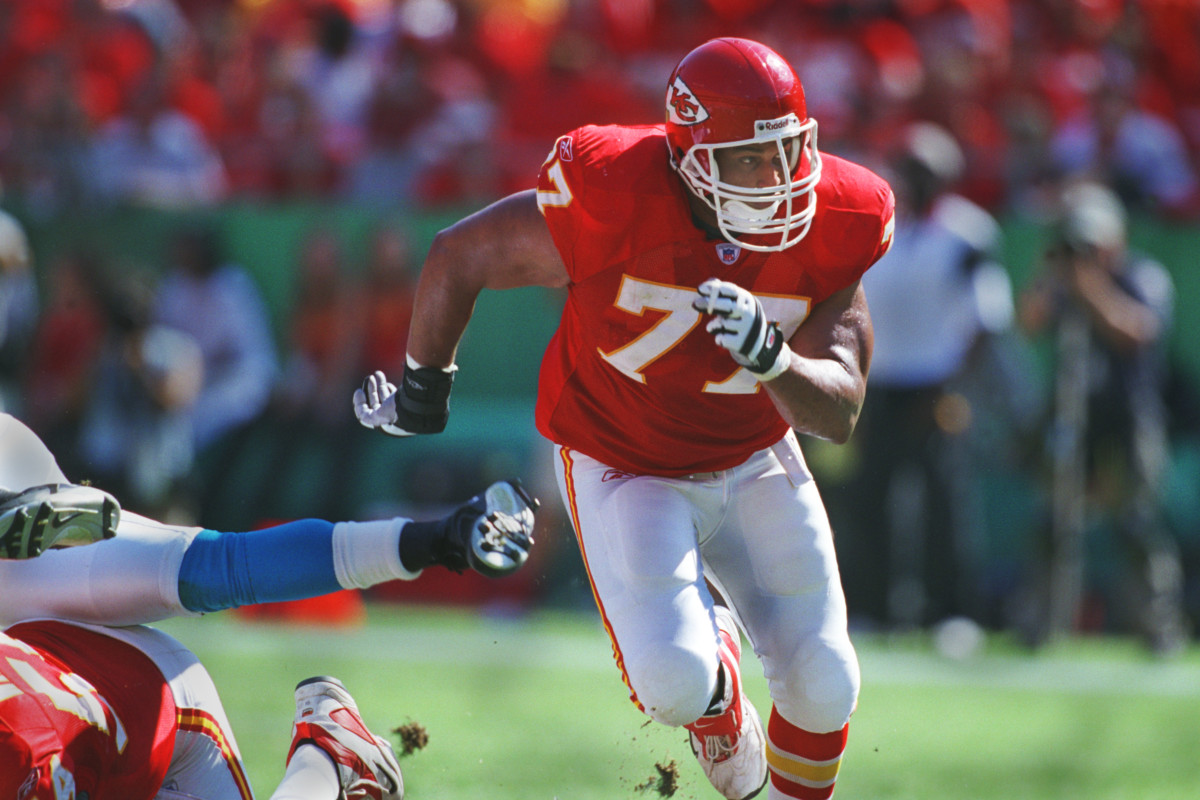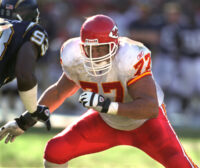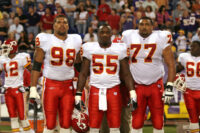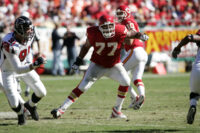Inductees
Willie Roaf

Born: April 18, 1970
His story, it seemed, was straight out of Hollywood:
An undersized lineman from Pine Bluff, Ark., gets no offers from Power 5 schools, heads off to little-known Louisiana Tech and yet, in five years, surges to the eighth overall selection in the 1993 National Football League Draft.
Think Willie Roaf’s work was done? Hardly. Over the next decade, he became one of the NFL’s best. And then, in 2002, nursing a surgically repaired knee, he was looking to write the final chapter to an improbable career. And found it – with the Kansas City Chiefs, as part of a tight-knit offensive line.
“We got after it,” Roaf said.
That they did, with Roaf cementing his legacy, and it’s why the Missouri Sports Hall of Fame proudly inducted Roaf with the Class of 2022.
A 2012 inductee of the Pro Football Hall of Fame, Roaf played 13 seasons in the NFL, with his final four seasons spent in Kansas City (2002-2005).
There, he was a three-time All-Pro offensive lineman selected to four Pro Bowls. He helped the high-powered Chiefs offense lead the NFL in points twice (2002, 2003) and win the 2003 AFC West Division championship.
The team also led the AFC in total yards in 2003, and the entire NFL in total yards in 2004 and 2005. Those were the coach Dick Vermeil (MSHOF Legend 2012) & quarterback Trent Green (MSHOF 2012) years.
“I don’t know if I would be in the (Pro Football) Hall of Fame today if I didn’t go to Kansas City,” Roaf was once quoted as saying.
A 6-foot-5, 300-pound lineman, Roaf had quite the pro career by making 189 career starts. He played his first nine seasons with the New Orleans Saints, earning All-Rookie honors in 1993 at right tackle before moving to left tackle the next season.
He then went on to earn First Team All-Pro seven times (1994-1996, 2000, 2003-2005), All-NFC six times and All-AFC three times. He also was voted to 11 Pro Bowls and was the NFL Players Association’s NFC Offensive Lineman of the Year twice.
The final chapter began in 2002 after the Saints traded Roaf to the Chiefs.
“I had mentioned I would like to play in Denver because I had a daughter there, and I don’t know if the Chiefs got wind of that,” Roaf said, noting that then-Chiefs Pro Personnel Director Bill Kuharich had drafted him to New Orleans years before. “To be honest, the Chiefs were the only team to offer me a real contract.”
In KC, he found his love for the game again on a line that featured right guard Will Shields (MSHOF 2009), left guard Brian Waters, center Casey Wiegemann and John Tait, who moved to right tackle so Roaf could handle left tackle. That group never missed a game.
Additionally, the low-cut grass of Arrowhead Stadium allowed him to wear rubber molded shoes, not cleats, and protected his knee.
“After games,” Roaf said, “we (the linemen) would watch video and be oohing and ahhing to see who had the best blocks that game. It was a lot of fun playing the last four years in Kansas City.”
Roaf’s relocation to Kansas City re-ignited the energy that fueled his surge from a no name to a legit pro prospect.
In Pine Bluff, the story goes that Louisiana Tech coaches had traveled to recruit two of his All-State teammates and happened to spot Roaf, not an All-Stater, dominating defenders.
At Louisiana Tech, he joined a pro-style offense led by a coaching staff full of former pros. One was line coach Petey Perot, a Philadelphia Eagles Super Bowl starting lineman.
Roaf co-captained the team his senior year, when Tech lost 13-0 to eventual national champion Alabama but not before his performance against two-time All-American Eric Curry solidified him as a high draft pick. In his years there, Tech lost 13-6 at Ole Miss and 16-14 at Auburn, plus tied South Carolina 12-12 and played Maryland to a 34-34 tie in the Independence Bowl.
At the NFL Combine, he ran the 40-yard dash in 4.98 seconds despite weighing 305 pounds, up 70 from his freshman year. In New Orleans, he simply listened to the veterans and soon became one of the best.
In Kansas City, he met his future wife, Angela. They have five children between them and three grandchildren. All these years later, he still thinks about that Chiefs O-line.
“We were fortunate to be able to play together,” Roaf said. “We were accountable to each other.”



